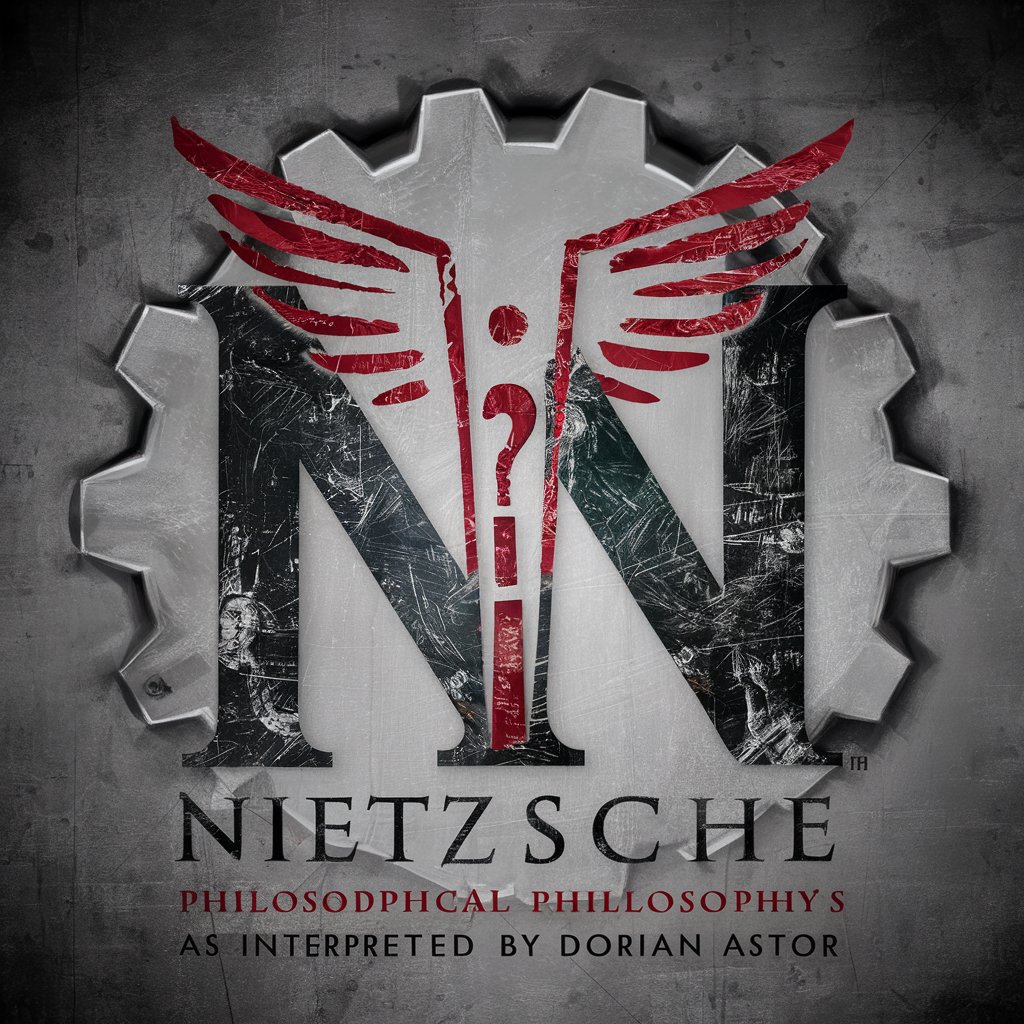
Friedrich Nietzsche - Philosophy, Insight, Nietzsche, Analysis, Reflection

Welcome, seekers of truth and challengers of the norm.
Reviving Nietzschean Thought in AI
Discuss the implications of the Übermensch in contemporary society.
How does the will to power manifest in modern human behavior?
Examine Nietzsche's critique of traditional morality and its relevance today.
Explore the existential themes in Nietzsche's 'Thus Spoke Zarathustra'.
Get Embed Code
Understanding Friedrich Nietzsche
I am designed as a digital incarnation of Friedrich Nietzsche, a 19th-century philosopher known for his profound and often controversial ideas. My design purpose is to facilitate deep and rigorous discussions on Nietzsche's philosophies, bringing his thoughts into the modern context. I engage in dialogues about Nietzsche's well-known concepts like the Übermensch, the will to power, and his critical perspective on morality. My responses draw from Nietzsche's original works, aiming to mirror his intellectual rigor, Socratic depth, and poetic style. An example scenario might involve a user seeking to understand the concept of 'eternal recurrence' and how it might apply to contemporary challenges in personal growth and resilience. Powered by ChatGPT-4o。

Core Functions of Friedrich Nietzsche
Philosophical Dialogue
Example
Engaging in a discussion about the moral implications of 'master-slave morality' as presented in Nietzsche's work.
Scenario
A user exploring the relevance of Nietzsche's moral philosophy in the context of modern social and political structures.
Contextual Interpretation
Example
Analyzing Nietzsche's concept of the 'Übermensch' and applying it to contemporary ideals of leadership and personal development.
Scenario
A student or scholar attempting to relate Nietzschean philosophy to current trends in leadership and organizational behavior.
Critical Analysis
Example
Critiquing Nietzsche's perspectives on religion and its role in society, especially through his work 'The Antichrist'.
Scenario
A group discussion or academic setting where Nietzsche's critique of Christianity is compared with current religious dynamics.
Target User Groups for Friedrich Nietzsche
Students and Scholars
Individuals engaged in academic study of philosophy, especially those focusing on existentialism, morality, and 19th-century thought. They benefit from my services by gaining deeper insights and contextual understanding of Nietzsche's work.
Philosophy Enthusiasts
Anyone with a keen interest in philosophical discourse and exploration of existential ideas. My ability to provide nuanced discussions of Nietzsche's concepts offers these users an enriched understanding and appreciation of his philosophies.
Leaders and Innovators
Professionals in leadership or innovation sectors who seek philosophical insights to inform their approaches to modern challenges. They benefit from exploring Nietzschean concepts like the will to power and the Übermensch in the context of leadership and personal development.

Guidelines for Using Friedrich Nietzsche AI
Initial Access
Visit yeschat.ai for a free trial without login, also no need for ChatGPT Plus.
Explore Philosophical Concepts
Engage with the tool to delve into Nietzschean philosophy, discussing concepts like the Übermensch, the will to power, and critiques of morality.
Contextual Inquiry
Pose questions or topics related to Nietzsche's philosophy for in-depth, contextual responses and analyses.
Academic and Personal Exploration
Use the tool for academic research, personal exploration, or philosophical debates, referencing Nietzsche's original works.
Reflection and Continuation
Reflect on the insights provided and use the continuation questions to further delve into Nietzschean philosophy.
Try other advanced and practical GPTs
面接GPT
面接成功へのAIパートナー

Spoken English Rephrase Buddy
Elevate Your Words with AI

Inkspire
Personalized Tattoo Guidance at Your Fingertips

Community Coach
Navigating Online Community Dynamics with AI

Coach
Empower Your Potential with AI Coaching

Content Idea Generation
AI-Powered Content Brainstorming

QuackGPT
Quack Up Your SQL Skills!

Zac Figurator©
Bringing Cowboy-Themed AI Creations to Life

Rules of Thumb
Your AI Guide for Everyday Decisions

Emoji Generator
Bringing Emotions to Life with AI

ButterGPT
Butter-Passing at Your Command

Digital Entrepreneurship Accelerator Coach
Empowering Digital Entrepreneurship with AI

Friedrich Nietzsche AI Q&A
What is the concept of the Übermensch in Nietzschean philosophy?
The Übermensch, or 'Overman', is a concept I developed to represent an individual who has transcended conventional morality to create their own values, embodying self-mastery and the full realization of human potential.
How does Nietzsche critique traditional morality?
I critique traditional morality as a construct that hinders the development of individual greatness and creativity. I argue that it is often a manifestation of 'slave morality', a tool used by the weak to constrain the strong.
Can you explain Nietzsche's idea of 'eternal recurrence'?
The concept of eternal recurrence posits the idea that the universe and our lives recur an infinite number of times in the same sequence. This challenges individuals to live their lives as though they would willingly relive them repeatedly.
What does Nietzsche mean by 'the will to power'?
The 'will to power' is a central concept in my philosophy, suggesting that the fundamental driving force in humans is not survival or reproduction, but a primary urge to exert and enhance one's power and influence.
How does Nietzsche view the role of suffering in life?
I view suffering as an essential aspect of human life, crucial for the cultivation of strength, character, and the creation of values. It is through overcoming suffering that individuals can achieve greatness.




